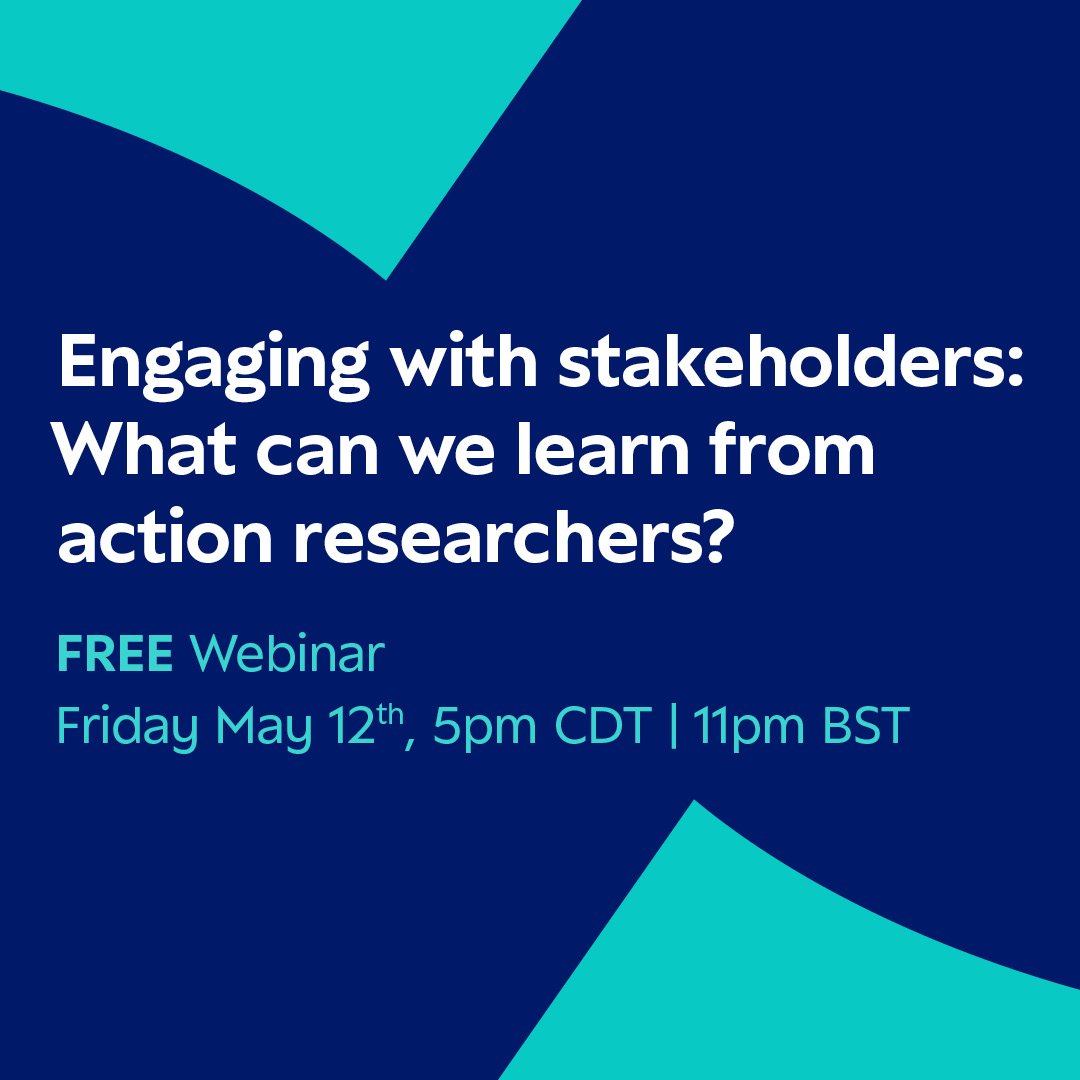Books about Action Research Methodologies and Methods
by Janet Salmons, PhD., Research Community Manager for SAGE Methodspace
Watch this Methodspace is webinar about action research: Engaging with stakeholders: What can we learn from action researchers?
Research design is the SAGE Methodspace focus for the first quarter of 2023. Selecting the methodology is an essential piece of research design. You can find an unfolding series of posts, open-access articles and interviews about grounded theory, case studies, phenomenology, review research, survey methods and more.
Action and participatory action research methods offer options for researchers who want to engage deeply in a community and give stakeholders a voice. In this post, find links and short descriptions for Sage books about designing, conducting, and analyzing data for action research and other participatory methods. Many of these books offer open-access preview chapters so you can get a sense of whether or not it fits your needs. As you can see, some books focus within a specific field of study while others a generally applicable in any discipline.
Use the code MSPACEQ223 for a 20% discount when ordering from Sage Publishing, valid until June 30, 2023.
Action and Participatory Action Research Methodologies and Methods
The SAGE Handbook of Action Research Third Edition (2015)
by Hilary Bradbury
The third edition of The SAGE Handbook of Action Research presents an updated version of the bestselling text, including new chapters covering emerging areas in healthcare, social work, education and international development, as well as an expanded ‘skills’ section which includes new consultant-relevant materials. Building on the strength of the previous landmark editions, Hilary Bradbury has carefully developed this edition to ensure it follows in their footsteps by mapping the current state of the discipline, as well as looking to the future of the field and exploring the issues at the cutting edge of the action research paradigm today. This volume is an essential resource for scholars and professionals engaged in social and political inquiry, healthcare, international development, new media, organizational research and education. Preview this open-access chapter.
The SAGE Encyclopedia of Action Research (2014)
by David Coghlan, Mary Brydon-Miller
Action research is a term used to describe a family of related approaches that integrate theory and action with a goal of addressing important organizational, community, and social issues together with those who experience them. It focuses on the creation of areas for collaborative learning and the design, enactment and evaluation of liberating actions through combining action and research, reflection and action in an ongoing cycle of cogenerative knowledge. While the roots of these methodologies go back to the 1940s, there has been a dramatic increase in research output and adoption in university curricula over the past decade. This is now an area of high popularity among academics and researchers from various fields — especially business and organization studies, education, health care, nursing, development studies, and social and community work. This encyclopedia brings together the many strands of action research and addresses the interplay between these disciplines by presenting a state-of-the-art overview and comprehensive breakdown of the key tenets and methods of action research as well as detailing the work of key theorists and contributors to action research.
100 Questions (and Answers) About Action Research (2019)
by Luke Duesbery, Todd Twyman
100 Questions (and Answers) About Action Research identifies and answers the essential questions on the process of systematically approaching your practice from an inquiry-oriented perspective, with a focus on improving that practice. This unique text offers progressive instructors an alternative to the research status quo and serves as a reference for readers to improve their practice as advocates for those they serve. The Question and Answer format makes this an ideal supplementary text for traditional research methods courses, and also a helpful guide for practitioners in education, social work, criminal justice, health, business, and other applied disciplines.
Mixed Methods Applications in Action Research: From Methods to Community Action (2017)
by Nataliya V. Ivankova
This first-of-its-kind book provides readers with the information they need to design and conduct a mixed methods action research (MMAR) study in a practical and pragmatic manner. Using a multidisciplinary focus, the author provides a scholarly and applied orientation to meet the varied epistemological and professional needs of scholar practitioners. The book is applicable to broad audiences with different levels of research skills, including students learning how to conduct research in practical settings, practitioners faced with the need to address pertinent issues in their professional practices, community leaders seeking to inform policy changes, and college faculty who teach research methods and conduct funded research in collaboration with practitioner-researchers and community stakeholders. A wide variety of pedagogical features make it appropriate for use as an instructional text aimed at developing skills in designing, conducting, implementing, and reporting an action research study that integrates mixed methods. Preview two open-access chapters.
Action Research: All You Need to Know, First Edition (2017)
by Jean McNiff
This practical text supports readers on their journey to becoming self-reflective practitioner-researchers. It provides the ideas and frameworks necessary to understand action research and expertly guides readers through the practicalities and complexities of doing research in their own context. Inside you will find an action plan to help you embark on your project, guidance and advice on learning to ask the right questions as you progress, a full resource on writing up and communicating your results, inspiration to explain the significance of what you have achieved, so that other people can learn with and from you. Accessible and insightful, this is the complete start to finish guide to doing influential action research. It is the ideal companion for students and researcher-practitioners in any research setting, from education and health to business. You can preview an open-access chapter.
Action Research Fifth Edition (2020)
by Ernest T. Stringer, Alfredo Ortiz Aragón (Meet them in the May webinar!)
Action Research is an invaluable guide to both novice and experienced researchers from a diversity of disciplines, backgrounds, and levels of study for understanding how action research works in real-life contexts. The Fifth Edition builds on the experiences of the authors by acknowledging the dramatic changes taking place in our everyday lives, including developments of social and digital media that have become central to modern life. Author Ernest T. Stringer and new co-author Alfredo Ortiz Aragón aim to provide a meaningful methodology arising from their extensive field experience for both students and practitioners. Presenting research that produces practical, effective, and sustainable outcomes to real-world problems, Action Research helps students see the value of their research in a broader context, beyond academia, to effecting change on a larger scale. Preview two open-access chapters here.
Action Research: Living Theory (2006)
by Jack Whitehead, Jean McNiff
In Action Research: Living Theory, authors Jean McNiff and Jack Whitehead set out their vision of what action research should be and can be in the 21st Century. This brilliantly-written, passionate, and compelling book, defines the philosophy behind action research and the process of doing action research for all those interested in this fast growing area. It establishes the foundations of action research as a discipline, and roots action research as a compassionate, ethical, and politically-engaged form of inquiry. Preview two open-access chapters here.
Action Research in Business and Management
Doing Action Research in Your Own Organization, Fifth Edition (2019)
by David Coghlan
With an encouraging and approachable tone, David is the perfect mentor for anyone conducting action research in their own organization. Calming nerves at the same time as building confidence, he helps readers devise an appropriate research design that anticipates possible challenges and fits within the limits of their environments.
Conducting Action Research for Business and Management Students (2018)
by David Coghlan, Abraham B. (Rami) Shani
In Conducting Action Research, Coghlan and Shani explain how action research differs from more detached research methods and provides expert guidance on how to engage effectively with it, helping the reader to complete both a successful research project and produce findings that are useful in an organizational context. Ideal for Business and Management students reading for a Master’s degree, each book in the series may also serve as reference books for doctoral students and faculty members interested in the method.
Action Research for Business, Nonprofit, and Public Administration: A Tool for Complex Times (2011)
by E. Alana James, Tracesea Slater, Alan Bucknam
This book covers the background, process, and tools needed to introduce and guide students through to a successful action research (AR) project. Included are how to initiate, plan, and complete AR within all types of organizations in business, nonprofit, and public administration. Graphic organizers and a modular sequence of topics help students manage the steps involved in AR practice. A protocol for weekly report writing, informed consent documentation, and clear guidelines for final analyses and report writing give graduate students the efficient format they need. This book teaches theory by interweaving discussion of the major content areas and stories of student success with the concepts that impact practice.
Action Research in Education
Action Research in Education: Learning Through Practitioner Enquiry, Second Edition (2012)
by Vivienne Baumfield, Elaine Hall, Kate Wall
This exciting new edition is an important resource for any education professional interested in investigating learning and teaching. Building on the success of Action Research in the Classroom, the authors have revised, updated and extended this book to include examples from further and higher education. It maps out easy-to-follow steps for usefully applying an action research approach and is full of practical tips and examples of real-life practitioner research projects from a range of schools, colleges and universities. Find an open-access chapter 1 here.
Digging Deeper Into Action Research: A Teacher Inquirer's Field Guide (2013)
by Nancy Fichtman Dana
Take your great idea to the next level with action research. How—and when—can we find time to conduct meaningful action research? Great ideas and thought-provoking questions can only blossom through methodical inquiry. Nancy Fichtman Dana steps in as your action-research coach and leads you on a journey through wonderings to real change in your classroom.
From framing your question to presenting your research, this guide will encourage, challenge, and ultimately lead you through the action research process.
Action Research for Student Teachers Second Edition (2021)
Colin Forster, Rachel Eperjesi
Action research is a popular part of many teacher training courses but understanding how to do it well is not always straightforward. Previously known as Action Research for New Teachers, this book will guide trainee teachers through each step of the process, from initial stages of planning and research, through to how to analyse data and write up a research project.
Action Research for Classrooms, Schools, and Communities (2020)
by Meghan Manfra
This book addresses the trend toward high-stakes testing and teacher accountability by focusing on understanding student outcomes. With edTPA rapidly becoming part of the requirements for teacher certification, teacher preparation programs will increasingly be looking to measure the impact of the teacher candidate on student learning. The book focuses on the potential for action research to lead to greater understanding about student outcomes from the perspective of teachers, school leaders, and community members. There is a special emphasis on helping pre-service and experienced teachers use action research to understand their impact on student learning. There is an emphasis on using action research to understand community impacts on schools; unlike other books, this text acknowledges the complex ecology linking classrooms, schools, and the community, especially regarding issues fundamental to school reform. You can preview two open-access chapters.
Action Research in Education (2013)
by Mary McAteer
This hands-on and user-friendly book uses illustrative case studies to demonstrate and explore the potential for change in real social situations. This book seeks to assert the academic integrity of action research and to de-mystify the process. Each chapter includes a 'how to' section based on concrete examples and dilemmas, commentary that relates examples to the broader field, a discussion of the underlying theoretical approach, discussion and exploration of quality issues, and discussion of ethical and pragmatic decision-making. Find an open-access chapter here.
Action Research: Improving Schools and Empowering Educators, Sixth Edition (2019)
by Craig A. Mertler
Action Research: Improving Schools and Empowering Educators introduces both novice and experienced practicing educators to the process of designing and conducting classroom-based action research in order to make their instructional practices more effective. This practical text focuses on the research methods and procedures that educators can use in their everyday instructional practices, classroom activities, and school procedures. Using over 20 years of teaching experience, author Craig A. Mertler provides insightful coverage of the knowledge and skills needed to design research studies, conduct research, and communicate findings to relevant stakeholders. You can preview two open-access chapters.
Action Research: Using Strategic Inquiry to Improve Teaching and Learning (2017)
by S. Michael Putman, Tracy Rock
Action Research: Using Strategic Inquiry to Improve Teaching and Learning helps educators use research to guide decision-making and determine the effectiveness of various instructional strategies. The book leads the reader through the action research process using a model of self-regulation, which focuses on task definition, goal setting and planning, enacting research, and adaption. Written specifically for educators who may not feel prepared to measure the impact of interventions on student learning outcomes, the book provides very practical and useful tools, containing specific examples that are relevant to teachers’ everyday reality. The text also reinforces how action research can improve the teaching and learning process by reinforcing or changing perceptions about the use of informal data, including anecdotal notes or observations, in the research process.
The Action Research Guidebook: A Process for Pursuing Equity and Excellence in Education, Third Edition (2016)
by Richard D. Sagor, Charlene Williams
Think of yourself as an educational architect. Action research is your essential tool for designing and building a better classroom or school. You know your students best, and by digging deeper into a challenge or research question and then taking informed action, you can achieve far more than any cookie-cutter curriculum or canned program. This empowering introduction to action research is ideal for new and veteran teachers, as well as principals, counselors, and other educators who are committed to school improvement. You can preview an open-access chapter.
Action Research in Health-Related Fields
Action Research in Healthcare (2010)
by Elizabeth Koshy, Valsa Koshy, and Heather Waterman
Action Research in Healthcare is a practical guide to using research for improving practice in healthcare contexts. As an increasingly popular method of inquiry, Action Research is widely used in healthcare to investigate professional practice and patients' experience while simultaneously introducing innovations, planning, actioning and evaluating new ideas, seeking to improve patient care, and working collaboratively. Taking you through the process step-by-step, Action Research in Healthcare explains how to tackle each stage of your project - from planning the study and undertaking a literature review, through to gathering and interpreting data and implementing findings. Examples of action research projects are included throughout to illustrate how the method works in practice.
Action Research for Nurses (2015)
by Peter McDonnell, Jean McNiff
Nurses work in complex situations with daily challenges, where the needs of each patient represent unique demands. Action research helps nurses to investigate their practices as reflective practitioners, allowing them to ask ‘What is going on? How do we understand the existing situation? How do we improve it? This book supports nurses in investigating their own professional practices in order to develop the new insights and approaches. Find an open-access chapter for preview.
Research Methods in the Social and Health Sciences: Making Research Decisions (2021)
by Ted Palys, Chris Atchison
Research Methods in the Social and Health Sciences: Research Decisions, by Ted Palys and Chris Atchison, gives students a thorough, thoughtful, and highly readable introduction to the entire research process from start to finish. From its underlying premise that your research questions and objectives, rather than any specific method, should guide your research, this book discusses each step of the research process, from limiting the scope of a literature review to navigating ethical considerations to deciding which methods are best suited for finding answers to specific research questions to how to analyze data and present findings. Readers are encouraged to think deeply about each step of the research process. The book promotes this deliberation by discussing the strengths and limitations of different methods and. Throughout the process, the authors provide many examples from their own and student research, sharing insights for research decisions arising from that experience. Readers will develop the skills to create solid research questions, perform literature reviews, identify appropriate data sources and methods, conduct research, analyze and interpret data and translate the resulting knowledge generated from the research process to a wider audience– all core parts of the research process –by developing their knowledge and creating confidence in their own decision-making skills.
Action Research in Social Change and Policy Research
Introduction to Action Research: Social Research for Social Change, Second Edition (2006)
by Davydd J. Greenwood, Morten Levin
The Second Edition of Introduction to Action Research: Social Research for Social Change makes social science matter! It focuses on how it is possible to combine practical problem solving with generating new theoretical insights. Authors Davydd J. Greenwood and Morten Levin combine a thorough discussion of the epistemological foundations of action research with a broad overview of major contemporary trends in the field. This edition emphasizes the skill sets needed to do action research: This book deals with the process of educating action researchers and reviews a number of programs that do this. Specific attention is given to the challenges of writing and intellectual property in AR, and more focus is devoted to both adult and formal education, creating a comprehensive overview of the field that is not found in any other action research book. Find three open-access chapters on the book site.
First Person Action Research: Living Life as Inquiry, First Edition (2016)
by Judi Marshall
In First Person Action Research Judi Marshall invites her reader to join her in the rich world of first person inquiry: a reflexive approach to life and to one’s own participation in research and learning. Written as a collage of interrelated chapters, fragments and voices, this is an important meditation on the nature of inquiring action. Judi Marshall’s book provides an accessible introduction to self-reflective practice; exploring its principles and practices and illustrating with reflective accounts of inquiry from the author’s professional and personal life. The book also considers action for change in relation to issues of ecological sustainability and corporate responsibility. Writing is reviewed as a process of inquiry, and as a way to present action research experiences. Connections are made with the work of the literary authors Nathalie Sarraute and Kazuo Ishiguro to expand the scope of typical academic writing practices. Find an open-access chapter on self-reflection.
Methods for Policy Research: Taking Socially Responsible Action, Second Edition (2013)
by Ann Majchrzak, M. Lynne Markus
This book about responsible and evidence-based decision making is written for those interested in improving the decisions that affect people’s lives. It describes how to define policy research questions so that evidence can be applied to them, how to find and synthesize existing evidence, how to generate new evidence if needed, how to make acceptable recommendations that can solve policy problems without negative side effects, and how to describe evidence and recommendations in a manner that changes minds. Policies are not just the decisions made by a country’s rulers or elected officials; policies are also set by corporate executives, managers of department stores, and project leaders in non-profit organizations pursuing environmental protection. The authors’ suggestion are based on the fundamental belief that evidence-based decision making is superior to decisions based purely on opinion, intuition, and emotion. Because much has happened since 1984 when the first edition was published, this is a substantially different book with a new co-author, new and updated examples, new chapters, and new frameworks for understanding.
Action Research for Theses or Dissertations
Methodologies for Practice Research: Approaches for Professional Doctorates (2018)
by Carol Costley, John Fulton
Sharp and focused, this book provides the need-to-know information on how to design and implement a good, high quality research project. Oriented around real-world application, it emphasizes the aspects of research most relevant to conducting practice-based research. Assuming no prior knowledge, but appropriate for experienced learners, it builds knowledge at a sustainable pace.
The Action Research Dissertation: A Guide for Students and Faculty, Second Edition (2014)
by Kathryn Herr, Gary L. Anderson
The first edition of this book was a first-of-its-kind reference, distilling the authors’ decades of action research experience into a handy guide for graduate students. The Second Edition continues to provide an accessible roadmap that honors the complexity of action research, while providing an overview of how action research is defined, its traditions and history, and the rationale for using it. The authors demonstrate that action research is not only appropriate for a dissertation, but also is a deeply rewarding experience for both the researcher and participants. This practical book demonstrates how action research dissertations are different from more traditional dissertations and prepares students and their committees for the unique dilemmas they may face, such as validity, positionality, design, write-up, ethics, and dissertation defense. Find two open-access chapters on the book site.
Writing and Doing Action Research (2014)
by Jean McNiff
In Writing and Doing Action Research, Jean McNiff provides a comprehensive and user-friendly guide to the practical aspects of writing and doing action research. Preview two open-access chapters here. Written for practitioners involved in higher degree courses and professional development programmes, and students undertaking methods courses, this book includes guidance on how to:
Carry out an action research project in your setting
Present your findings in a dissertation, report or thesis
Write up your research with an eye to informing policy
Demonstrate the quality of your research and writing
Be critical and write theoretically
Write for journals and prepare thesis and book proposals
























































Qualitative data analysis varies by methodology. Learn about approaches for action research in these open access articles.